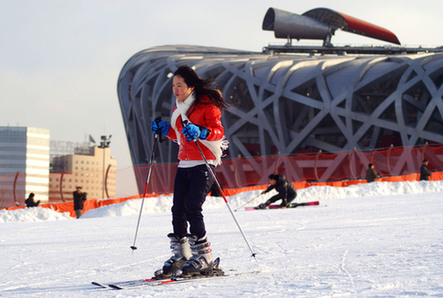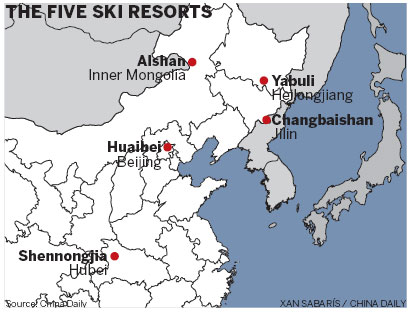Snow business
Updated: 2011-01-14 10:36
By Liu Lu (China Daily European Weekly)
 |
|
A temporary ski slope has been installed at the Bird's |
The international skiing industry is declining, except in China
Skiing only caught on for ordinary Chinese in the mid-1990s in the country's north and northeast, but has since blossomed into a pastime that can be practised nationwide. So far, more than 200 ski resorts, most of them quite small, have opened everywhere from western China's Xinjiang region and the Tibetan plateau to the southwestern province of Yunnan and Inner Mongolia in the north. On the outskirts of Beijing, about 10 ski areas are in operation, most of them using artificial snow to lure weekend daytrippers, as the region's winters have seen less and less precipitation.
And there is even an artificial ski slope operating next to the Bird's Nest (pictured) offering beginners a gentle ride.
French leisure group Club Med formally opened its first resort in China last month in the icy northeast, cashing in on a newfound love for winter sports among an increasingly wealthy middle class. Club Med is hoping to attract clients from across China, and even Southeast Asia, to its new village in Yabuli, which features 18 ski slopes.
"Most of the industry is in decline. China is really the only place where the industry is growing," says Justin Downes, a Canadian from the ski resort of Whistler who advises investors on the winter sports sector in China.
Here are five resorts worthy of consideration.
1. Yabuli Ski Resort
The ski resort, built on Yabuli Sun Mountain, part of the Changbai Mountain Range, is located in China's northernmost province, Heilongjiang. It is about 180 kilometers southeast of the province's capital city, Harbin.
 |
It is the best in terms of snow quality, skiing trails and spectacular views. Wild animals are frequently spotted on the site.
The resort serves as the primary training venue for China's national teams. It also has a trail vertical drop from 200 meters to 1,200 meters with an average drop of 700 meters.
What's cool: The largest ski resort in China.
Location: Harbin, Heilongjiang province in Northeast China.
Skiing season: From middle November to late March.
Target group: Suitable for skiers of all levels.
2. Alshan Ski Resort
Stretching over 10 km of pristine land, this place is one of China's best ski resorts. It is in North China's Inner Mongolia autonomous region and near the mountainous border with Mongolia. It also serves as one of the training bases for China's national skiing team.
The resort has a yearly snow fall period of 180 days between November and April, and quality of snow is excellent. It has two main sections: one area for experienced skiers, and another Alpine section for amateurs. In addition to skiing, travelers can also explore other fun activities with authentic Mongolian flavor on the vast grasslands, such as watching horse racing, wrestling, archery and hunting.
What's cool: This resort is a place surrounded by evergreen virgin forests and has plenty of Alpine and cross-country trails.
Ski season: From November to April.
Getting there: Take a flight from Beijing or Shanghai to Ulanhot. Upon arrival, board a bus or train bound for Alshan Ski Resort. It is about 4-hour bus ride from Ulanhot and about 700 km (15-hour bus drive) from Yabuli Ski Resort.
Target group: Suitable for skiers of all levels.
E-paper

Ear We Go
China and the world set to embrace the merciful, peaceful year of rabbit
Preview of the coming issue
Carrefour finds the going tough in China
Maid to Order
Specials

Mysteries written in blood
Historical records and Caucasian features of locals suggest link with Roman Empire.

Winning Charm
Coastal Yantai banks on little things that matter to grow

New rules to hit property market
The State Council launched a new round of measures to rein in property prices.
